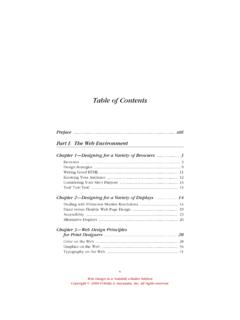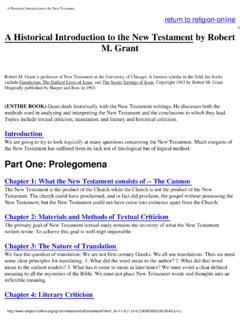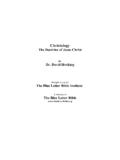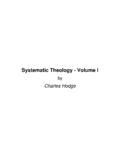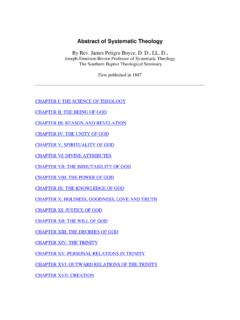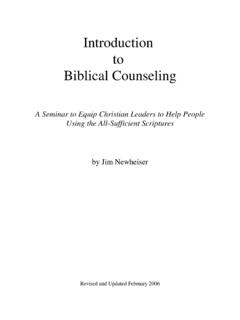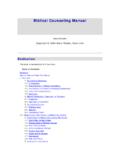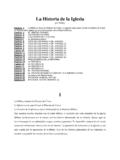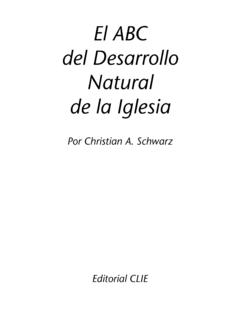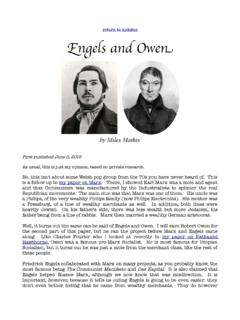Transcription of A Brief Declaration and Vindication of The Doctrine of the ...
1 A Brief Declaration and Vindication of The Doctrine of the Trinity by John Owen About A Brief Declaration and Vindication of The Doctrine of the Trinity by John Owen Title: A Brief Declaration and Vindication of The Doctrine of the Trinity URL: Author(s): Owen, John (1616-1683). Publisher: Grand Rapids, MI: Christian Classics Ethereal Library Description: Few of Owen's treatises have been more extensively circulated and generally useful than his Brief Declaration and Vindication of the Doctrine of the Trinity. At the time when the treatise was published, the momentous doctrines of the Trinity and the Atonement were violently assailed; but it was not so much for the refutation of opponents as for the edification and establishment of the plain Christian, that our author composed the following little work.
2 The reader will find in it traces of that deep and familiar acquaintance with opposing views, and with the highest theology involved in the questions which might be expected from Dr Owen on a subject which he seems to have studied with peculiar industry and research. Publication History: First edition 1669. The Works of John Owen, edited by William H. Goold, first published by Johnstone and Hunter 1850 1853. Reprinted by photolithography and published by The Banner of Truth Trust, Edinburgh 1965. Print Basis: The Banner of Truth Trust, Edinburgh, 1965. Series: The Works of John Owen Status: Proof-read and ThML markup added. Editorial Comments: Modern verb forms introduced by a previous editor of the text ( doth does) have been retained Contributor(s): Timothy Lanfear (Markup).
3 CCEL Subjects: All; Theology; Proofed;. LC Call no: BT110. LC Subjects: Doctrinal theology God Doctrine of the Trinity A Brief Declaration and Vindication of The Doctrine of the Trinity John Owen Table of Contents About This Book.. p. ii A Brief Declaration and Vindication of The Doctrine of the Trinity.. p. 1. Prefatory Note.. p. 2. To the Reader.. p. 3. The Preface.. p. 6. The Doctrine of the Holy Trinity Explained and Vindicated.. p. 12. Of the Person of Christ.. p. 38. Of the Satisfaction of Christ.. p. 42. An Appendix.. p. 57. Indexes.. p. 67. Index of Scripture References.. p. 67. Index of Citations.. p. 69. Index of Names.. p. 69. Greek Words and Phrases.. p. 71. Hebrew Words and Phrases.. p. 72. Latin Words and Phrases.. p. 72. Index of Pages of the Print Edition.
4 P. 74. iii A Brief Declaration and Vindication of The Doctrine of the Trinity John Owen iv The Doctrine of the Trinity John Owen A Brief 365. Declaration and Vindication of The Doctrine of the Trinity and also of The Person and Satisfaction of Christ accommodated to the capacity and use of such as may be in danger to be seduced; and the establishment of the truth. Search the Scriptures. John v. 39. The Doctrine of the Trinity John Owen 366. Prefatory note Few of Owen's treatises have been more extensively circulated and generally useful than his Brief Declaration and Vindication of the Doctrine of the Trinity, etc. It was published in 1669;. and the author of the anonymous memoir of Owen, prefixed to an edition of his Sermons in 1720, informs us This small piece has met with such an universal acceptance by true Christians of all denominations, that the seventh edition of it was lately published.
5 An edition printed in Glasgow was published in 1798, and professes to be the eighth. A translation of the work appeared in the Dutch language (Vitringa, Doct. Christ., pars vi. p. 6, edit. 1776). At the time when the treatise was published, the momentous doctrines of the Trinity and the Atonement were violently assailed; but it was not so much for the refutation of opponents as for the edification and establishment of the plain Christian, that our author composed the following little work. The reader will find in it traces of that deep and familiar acquaintance with opposing views, and with the highest theology involved in the questions which might be expected from Dr Owen on a subject which he seems to have studied with peculiar industry and research. Reference may be made to his Vindici Evangelic and his Exposition of the Epistle to the Hebrews, in proof how thoroughly he had mastered the whole controversy in regard to the divinity and satisfaction of Christ, so far as the discussion had extended in his day.
6 His controversy with Biddle, in which he wrote his Vindici Evangelic , took place in 1655; and the first volume of the Exposition . was published only the year before the Brief Declaration , etc., appeared. The latter may be regarded, accordingly, as the substance of these important works, condensed and adapted to popular use and comprehension, in all that relates to the proper Godhead of the Son, and the nature of the work which he accomplished in the redemption of his people. For the special object which he had in view, he adopts the course which has since been generally approved of and pursued, as obviously the wisest and safest in defending and expounding the Doctrine of the Trinity. He appeals to the broad mass of Scripture evidence in favour of the Doctrine , and after proving the divine unity, together with the divinity of Father, Son, and Holy Ghost respectively, is careful not to enter on any discussion in regard to the unrevealed mysteries involved in the relations of the Trinity, beyond what was necessary for the refutation of those who argue, that whatever in this high Doctrine is incomprehensible by reason, must be incompatible with revelation.
7 This little work is farther remarkable for the almost total absence of the tedious digressions, which abound in the other works of Owen. Such logical unity and concentration of thought is the more remarkable, when we find that the treatise was written, as he tells us, in a few hours. But it was a subject on which his mind was fully stored, and his whole heart was interested. The treatise which follows, therefore, was not the spark struck in some moment of collision, and serving only a temporary purpose, but a steady flame nourished from the beaten oil of the sanctuary. Ed. 2. The Doctrine of the Trinity John Owen 367. To the Reader Christian Reader, This small treatise has no other design but thy good, and establishment in the truth. And therefore, as laying aside that consideration alone, I could desirously have been excused from the labour of those hours which were spent in its composure; so in the work itself I admitted no one thought, but how the things treated of in it might and ought to be managed unto thy spiritual benefit and advantage.
8 Other designs most men have in writing what is to be exposed to public view, and lawfully may have so; in this I have nothing but merely thy good. I have neither been particularly provoked nor opposed by the adversaries of the truth here pleaded for; nor have any need, from any self-respect, to publish such a small, plain discourse as this. Love alone to the truth, and the welfare of thy soul, has given efficacy to their importunity who pressed me to this small service. The matters here treated of are on all hands confessed to be of the greatest moment, such as the eternal welfare of the souls of men is immediately and directly concerned in. This all those who believe the sacred truths here proposed and explained do unanimously profess and contend for; nor is it denied by those by whom they are opposed.
9 There is no need, therefore, to give thee any especial reasons to evince thy concernment in these things, nor the greatness of that concernment, thereby to induce thee unto their serious consideration. It were well, indeed, that these great, sacred, and mysterious truths might, without contention or controversies about them, be left unto the faith of believers, as proposed in the Scripture, with that explanation of them which, in the ordinary ministry and dispensation of the gospel, is necessary and required. Certainly, these tremendous mysteries are not by us willingly to be exposed, or prostituted to the cavils of every perverse querist and disputer; those ,1 whose pretended wisdom (indeed ignorance, darkness, and folly) God has designed to confound and destroy in them and by them.
10 For my part, I can assure thee, reader, I have no mind to contend and dispute about these things, which I humbly adore and believe as they are revealed. It is the importunity of adversaries, in their attempts to draw and seduce the souls of men from the truth and simplicity of the gospel in these great fundamentals of it, that alone can justify any to debate upon, or eristically [in the form of controversy] to handle these awful mysteries. This renders it our duty, and that indispensably, inasmuch as we are required to contend earnestly for the faith once delivered unto the saints. But yet, also, when this necessity is imposed on us, we are by no means discharged from that humble reverence of mind wherewith we ought always to be conversant about them; nor from that regard unto the way and manner of their revelation in the Scripture which may preserve us from all unnecessary intermixture of litigious or exotic phrases and expressions in their assertion and Declaration .
